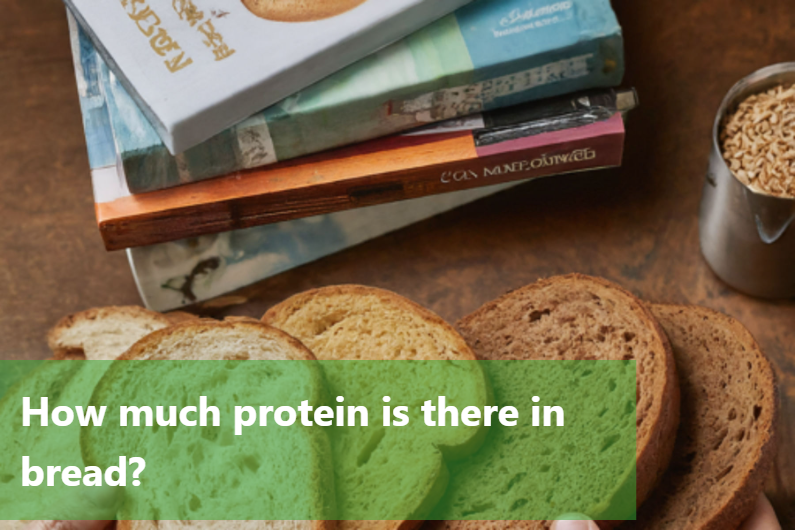
How much protein is there in bread?
Protein is an essential nutrient, critical for building and repairing tissues, regulating hormones and enzymes, and supporting our immune function. Historically, bread has been a dietary staple, a convenient vehicle for nutrients.
Modern food science allows us to fortify bread with supplemental protein, uniting nutritional potency with accessibility and familiarity. By studying the functional properties of protein and tracing bread's origins throughout human civilization, we uncover an intriguing balance of science and culture.
These protein-enriched baked goods blend nutritional value with ease of use in contemporary life. As nutritional awareness expands, the potential applications are vast for meshing science with taste. Perhaps a journey into this domain of discovery may unveil possibilities that spark your interest or imagination as well. You will find examining the chemistry of food alongside its role in society quite fascinating.

Nutrients content of bread
Nutrients found in a standard slice of white bread (approximately 25 grams) are:
Nutrient |
Amount per Slice (25g) |
|---|---|
Calories |
70-80 |
Carbohydrates |
12-15 g |
Protein |
2-3 g |
Fat |
1 g |
Fiber |
1 g |
Sugars |
1-2 g |
Calcium |
15 mg |
Iron |
1 mg |
Sodium |
140 mg |
Potassium |
30 mg |
Uncovering the Protein Content in Various Types of Bread
Type of Bread |
Protein per Slice (25g) |
Benefits |
|---|---|---|
Whole Wheat Bread |
3-4 g |
Higher fiber content, more nutrients |
Multigrain Bread |
2-3 g |
Varied grains for different nutrients |
Rye Bread |
2-3 g |
Potential lower glycemic index |
Sourdough Bread |
2-3 g |
Easier digestion for some individuals |
Gluten-Free Bread |
1-2 g |
Suitable for those with gluten intolerance |
Whole Wheat Bread: Provides more fiber and nutrients compared to refined white bread, promoting digestive health and sustained energy.
Multigrain Bread: Offers a variety of grains, each contributing different nutrients, potentially supporting overall health.
Rye Bread: May have a lower glycemic index compared to wheat bread, helping manage blood sugar levels.
Sourdough Bread: Contains probiotics and may be easier to digest for some individuals.
Gluten-Free Bread: Suitable for those with gluten intolerance or celiac disease, offering an alternative to traditional wheat-based breads.
Is Protein Bread a Good Source of Protein?
Protein bread, often marketed as a high-protein alternative to traditional bread, has become popular because it can increase the protein in our diets.
We need to examine the ingredients in protein bread to determine if it is a decent source of protein.
For those looking to up their protein intake, protein bread is a great option because it typically includes additional protein sources such as whey, soy, or pea protein.
Incorporating these extra protein sources into the bread recipe might enhance its nutritional value by enhancing its amino acid composition.
The fact that it has more protein than white bread is one of its many wonderful qualities. Protein can aid with muscle growth and maintenance as well as satiety, thus this may be useful for those who wish to increase their protein intake.
However, there are a few things concerning protein bread that require our utmost caution. There are protein breads that aren't as healthy since they contain sugar, preservatives, or other unhealthy elements.
In addition, those who have food allergies or dietary restrictions should read the labels to ensure they are safe to consume.
Protein bread is a great way to increase the amount of protein we consume. The nutritional content of protein bread can be enhanced by selecting it with fewer unnecessary ingredients and by adding healthy components. Making smart decisions regarding adding protein bread to our diets requires consideration of our own nutritional needs and goals.

Bread and Protein: A Nutritional Overview
We examined the significant connection between bread and protein. We talked about the importance of knowing the protein content of bread. In addition, we discovered the importance of protein in our daily diet and why bread is an essential food. We investigated high-protein bread and looked into what makes bread different in terms of protein content. We checked the protein content of white, specialty, and whole grain breads, among others. We went over protein bread's dependability and its advantages and disadvantages.
Making informed decisions about what to eat requires knowledge about the protein composition of bread. A better diet and more informed food choices are possible when people are aware of the protein composition of various bread kinds. Knowing the protein composition of bread assists in choosing the greatest choices for one's needs, whether that's for sports or general health.
Knowing that bread contains protein helps people monitor their protein consumption and make sure it's good for them. Having this knowledge is crucial for sticking to a healthy and balanced diet. To make healthy food choices, knowing how much protein is in bread is vital.
This Blog post is an initiative by Lo! Foods, to provide accurate and Nutritionist / Doctor approved information related to Health. Lo! Foods is India's leading brand for Everyday Functional Foods. Foods designed for specific Health conditions or Needs. Lo! Foods also runs India's largest range of Low Carb Healthy Cloud Kitchens, under the brand names of Lo!, ProteinChef, ATH (All Things Healthy) and DiabeSmart.











Leave a comment
Your email address will not be published.